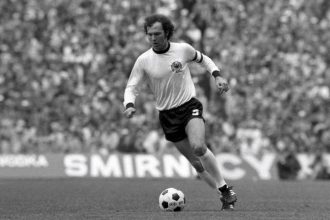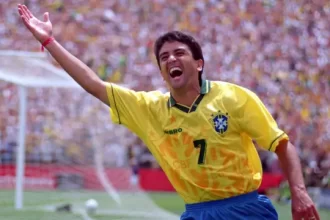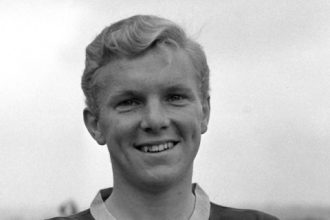The 1990 FIFA World Cup held in Italy was a monumental event that captivated football fans around the globe. This tournament showcased thrilling matches, memorable goals, and iconic performances that have etched their place in football history. From the intense rivalries on the pitch to the dramatic moments that unfolded, the 1990 World Cup left an indelible mark on the sport. Let us delve into the highlights and key aspects of this extraordinary tournament.
The tournament kicked off on June 8, 1990, with matches played across various cities in Italy. A total of 24 teams from different nations competed in their quest for football glory. The tournament featured notable teams and legendary players, each bringing their unique style and strategies to the field.
Teams:
Austria, Belgium, Czechoslovakia, England, Italy (hosts), Netherlands, Republic of Irelan, Romania, Scotland, Soviet Union, Spain, Sweden, West Germany, Yugoslavia, Costa Rica, United States, Argentina (holders), Brazil, Colombia, Uruguay, South Korea, United Arab Emirates, Egypt, and Cameroon.

The 1990 World Cup witnessed numerous memorable matches that left fans on the edge of their seats. From the iconic clash between Argentina and Italy in the semifinals to the thrilling final between West Germany and Argentina, the tournament was filled with excitement and drama.
twelve stadiums in twelve cities were selected to host matches at the 1990 World Cup. The Stadio San Nicola in Bari and Turin’s Stadio delle Alpi were completely new venues opened for the World Cup. Of the twelve stadiums used, only four (San Siro, Luigi Ferraris, Comunale of Florence, and Renato Dall’Ara) had been used for the 1934 FIFA World Cup.
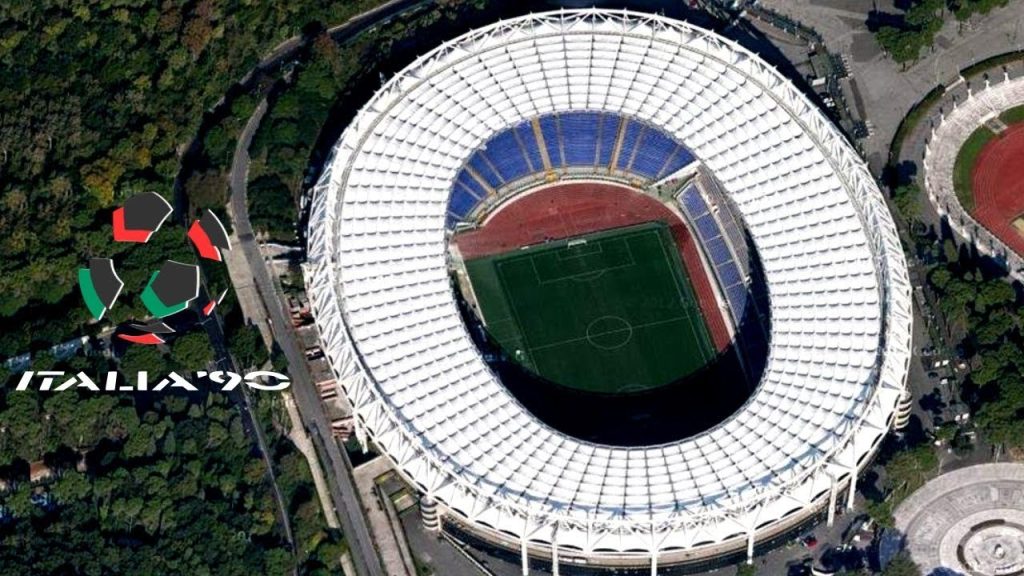
One of the standout moments of the tournament was the remarkable performance of Cameroon. They emerged as the surprise package of the tournament, defeating defending champions Argentina in a memorable opening match. Their fearless style of play and underdog spirit captivated the world.

The 1990 World Cup also showcased the brilliance of several football legends. One such standout player was Salvatore Schillaci, an Italian forward, who emerged as the tournament’s top scorer with six goals. His electrifying performances earned him the Golden Boot award and made him a national hero in Italy.

Other notable players who left their mark on the tournament include Lothar Matthäus of West Germany, Diego Maradona and Goycochea of Argentina, and Roger Milla of Cameroon. These players displayed exceptional skill, leadership, and game-changing abilities, contributing to the tournament’s overall excitement.

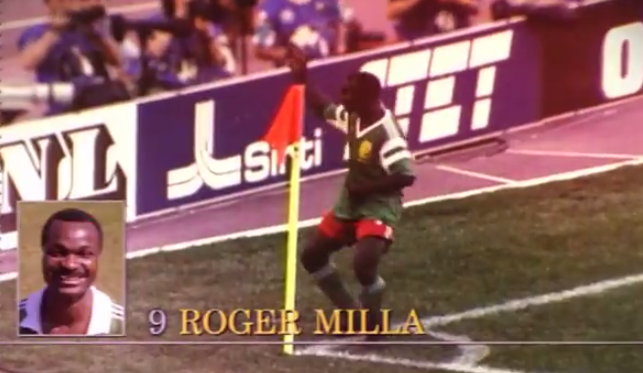
The first semi-final featured the host nation, Italy, and the world champions, Argentina in Naples. ‘Toto’ Schillaci scored yet again to put Italy ahead in the 17th minute, but Claudio Caniggia equalized midway through the second half, breaking Walter Zenga’s clean sheet streak throughout the tournament. There were no more goals in the 90 minutes or in extra time despite Maradona (who played for Naples in Serie A at the time) showing glimpses of magic, but there was a sending-off: Ricardo Giusti of Argentina was shown the red card in the 13th minute of extra time. Argentina went through on penalties, winning the shoot-out 4–3 after more heroics from Goycochea.
The semi-final between West Germany and England at Juventus’ home stadium in Turin was goalless at half-time. Then, in the 60th minute, a free-kick tapped to Andreas Brehme resulted in a shot that was deflected off Paul Parker into his own net. England equalized with ten minutes left; Gary Lineker was the scorer. The game ended 1–1. Extra time yielded more chances. Klinsmann was guilty of two glaring misses and both sides struck a post. England had another Platt goal disallowed for offside. The match went to penalties, and West Germany went on to win the shoot-out 4–3.
The two matches had the exact same score at 1–1, an identical penalty shootout score at 4–3, and the same order of penalties scored.
3rd Place: The game saw three goals in a 15-minute spell near the end of the match. Roberto Baggio opened the scoring after a mistake by England’s goalkeeper Peter Shilton, in his final game before international retirement, presented a simple opportunity. A header by David Platt leveled the game 10 minutes later but Schillaci was fouled in the penalty area five minutes later, leading to a penalty. Schillaci himself got up to convert the kick to win him the tournament’s Golden Boot for his six-goal tally. Nicola Berti had a goal ruled out minutes later, but the hosts claimed third place. England had the consolation prize of the Fair Play award, having received no red cards and the lowest average number of yellows per match.
The final between West Germany and Argentina has been cited as the most cynical and lowest-quality of all World Cup Finals. In the 65th minute, Argentina’s Pedro Monzon – himself only recently on as a substitute – was sent off for a foul on Jürgen Klinsmann. Monzon was the first player sent off in a World Cup Final.
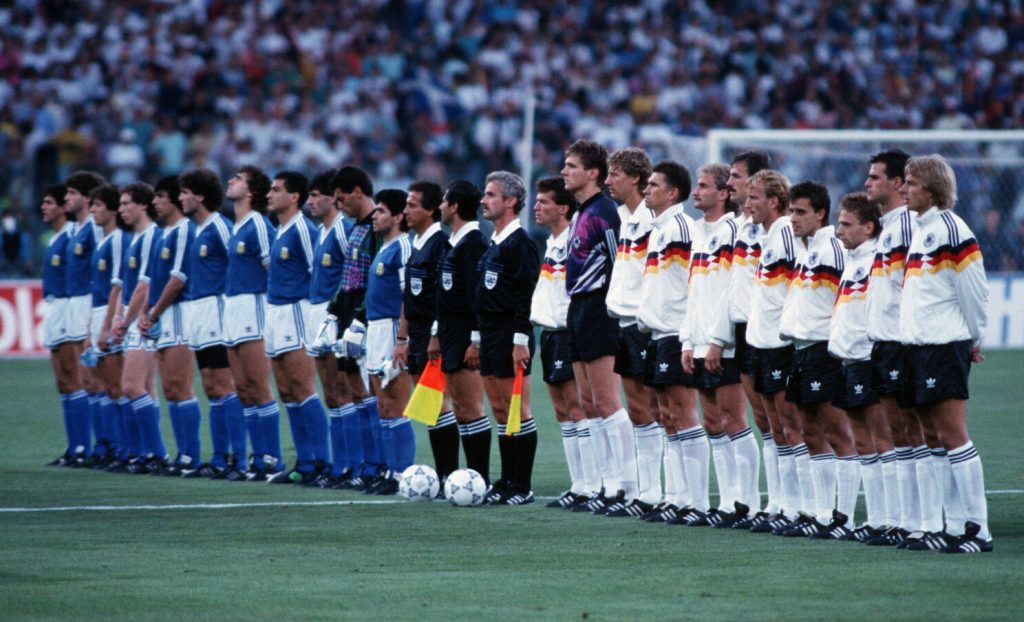
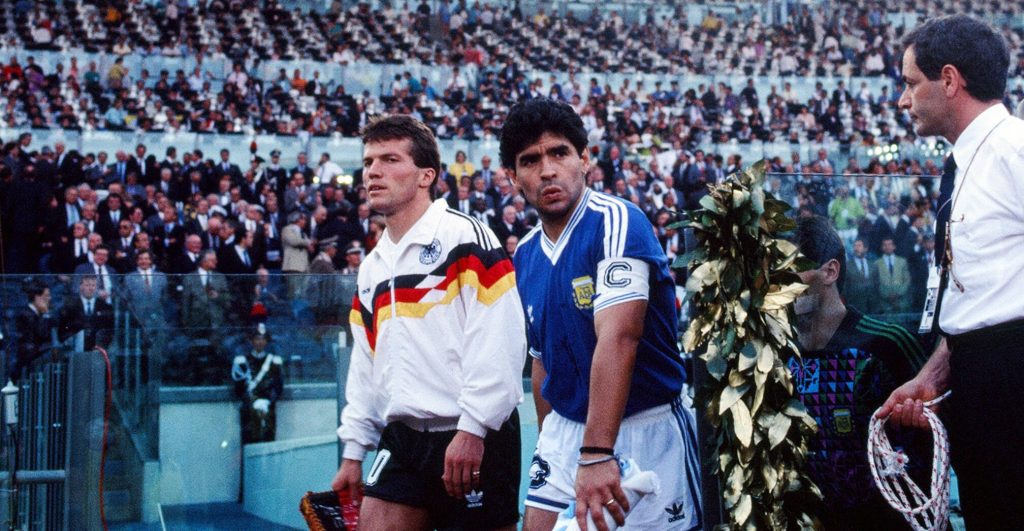
Argentina, weakened by suspension and injury, offered little attacking threat throughout a contest dominated by the West Germans, who struggled to create many clear goalscoring opportunities. The only goal of the contest arrived in the 85th minute when Mexican referee Edgardo Codesal awarded a dubious penalty to West Germany, after a foul on Rudi Völler by Roberto Sensini leading to Argentinian protests. Andreas Brehme converted the spot kick to settle the contest. In the closing moments, Argentina was reduced to nine after Gustavo Dezotti, who had already been given a yellow card earlier in the match, received a red card when he hauled Jürgen Kohler to the ground during a stoppage in play. The 1–0 scoreline provided another first: Argentina was the first team to fail to score in a World Cup Final.
With its third title (and three second-place finishes) West Germany – in its final tournament before national reunification – became the most successful World Cup nation at the time along with Italy and Brazil (also won three titles each then). West German manager Franz Beckenbauer became the first man to both captains (in 1974) and manage a World Cup-winning team, and only the second man (after Mário Zagallo of Brazil) to win the World Cup as a player and as team manager. It was also the first time a team from UEFA won the final against a non-European team.
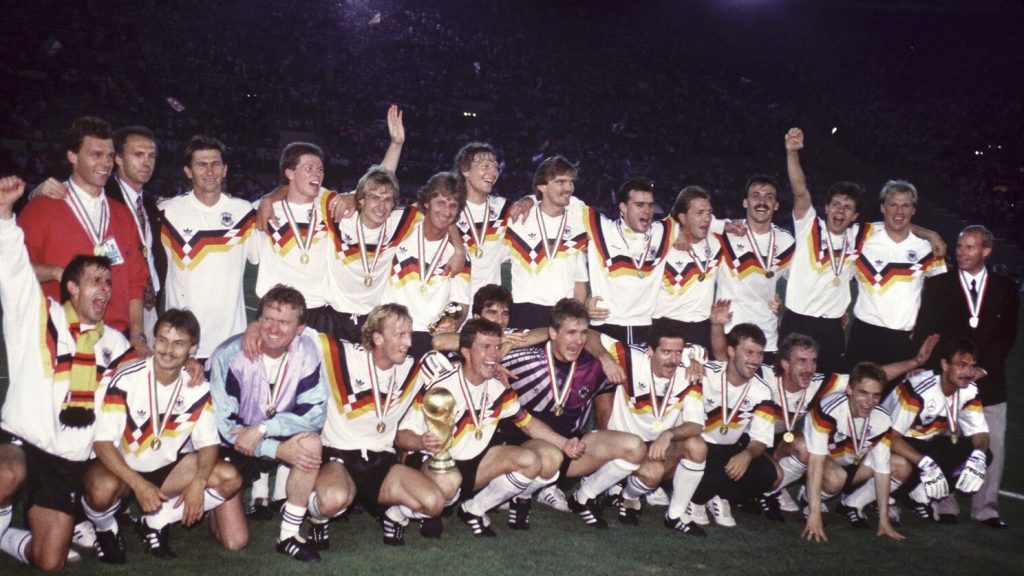
The 1990 World Cup left a lasting impact on the sport of football. It showcased the importance of teamwork, individual brilliance, and tactical prowess. The tournament also marked the end of an era, as it was the last World Cup for legendary players like Gary Lineker, who had graced the global stage for years.
The tournament generated a record-low goals-per-game average and a then-record of 16 red cards were handed out. In the knockout stage, many teams played defensively for 120 minutes, with the intention of trying their luck in the penalty shoot-out, rather than risk going forward. Two exceptions were the eventual champions West Germany and hosts Italy, the only teams to win three of their four knockout matches in standard time. There were four penalty shoot-outs, a record equaled with 2006, 2014, and 2018 tournaments, until it was surpassed by the 2022 tournament, with five. Eight matches went to extra time, also a record tied with the 2014 tournament.
Losing finalists Argentina were prime examples of this trend of cautious defensive play, choosing to do so because 3 of their best players were left off the squad due to injury. They scored only five goals in the entire tournament (a record low for a finalist). Argentina also became the first team to advance twice on penalty shoot-outs and the first team to fail to score and have a player sent off in a World Cup final.
As a result of this trend, FIFA introduced the back-pass rule in time for the 1994 tournament to make it harder for teams to time-waste by repeatedly passing the ball back for their goalkeepers to pick up. Three, rather than two points would be awarded for victories at future tournaments to help further encourage attacking play.
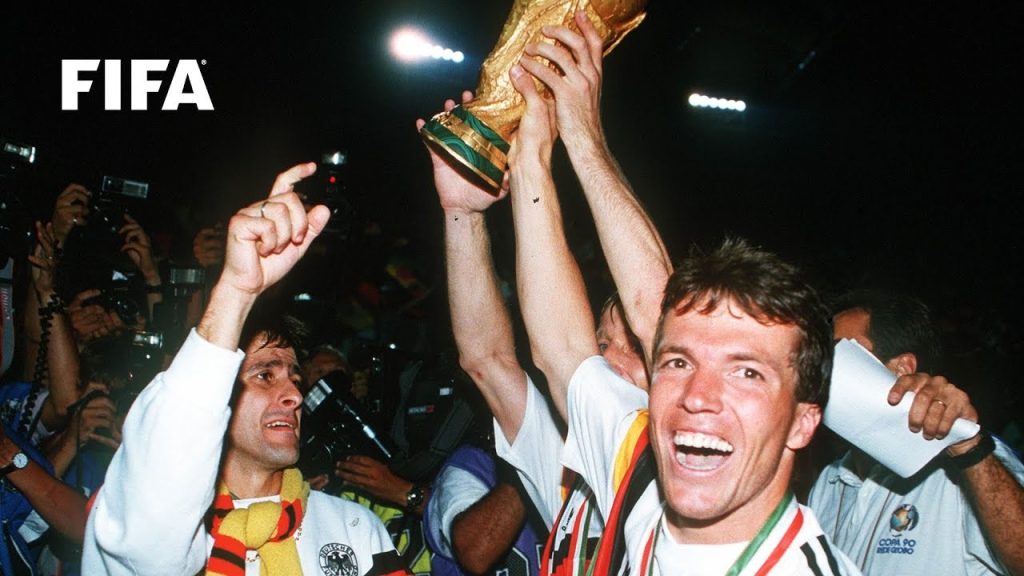
The 1990 FIFA World Cup stands as a testament to the power of football to unite nations, inspire generations, and create lifelong memories. From the thrilling matches to the unforgettable performances, this tournament exemplified the essence of the beautiful game. As football fans, we cherish the memories and celebrate the 1990 World Cup as a milestone in the sport’s history.


